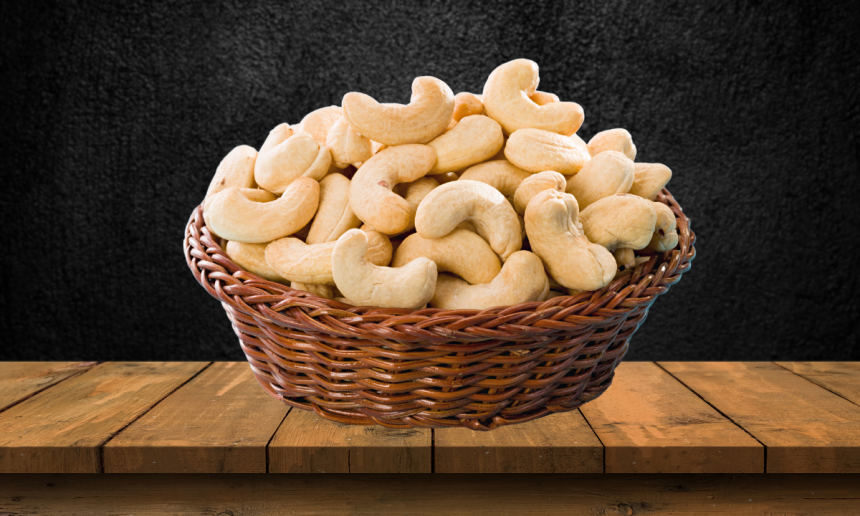Cashew nuts
Cashew nuts are the fruit of the cashew tree, an exotic tree which now inhabits many areas of the world.
The official origin of the cashew nut is thought to be Brazil, but there are also mentions in Indian and South East Asian history which states that the tree was able to grow and thrive in their tropical climates.
Today, we know them as a tasty, satisfying snack or as a versatile ingredient used in cooking for sauces or in butter.
However, it’s probably a little known fact that in their natural form, cashew nuts can be quite toxic and cannot be consumed until they’ve been roasted.
Health benefits of cashews

May improve heart health
People who eat diets high in nuts, including cashews, are less at risk of heart disease than those who don’t.
This is thought to be because Cashew nuts are particularly high in unsaturated fats, which have been linked to lower heart disease in some studies.
In addition to this, cashews are also a great source of fibre and contain almost the same protein as an equivalent quantity of cooked meat.
May lower cholesterol
Cashew nuts seem to lower the amount of ‘bad’ cholesterol in the body and increase the amount of ‘good’ cholesterol.
This is very much down to the fact that cashews are low in unsaturated fat, meaning that by default they should help you lower cholesterol when used as part of a healthy, balanced diet.
May help you lose weight
As a rule, nuts are generally high in calories and fats making them a bit limited for those on a diet.
However, some research has linked nut-rich diets to weight loss and overall lower body weight than those that leave them out altogether.
It is thought that your body may only digest around 84% of the calories of a cashew, it is therefore thought likely some of the fat remains in the nuts compound wall, known as the fibrous, rather than being digested.
May lower blood sugar
For the same reason as above, those who eat cashew nuts as part of a well-balanced diet may see a reduction in blood sugar.
A 2018 study showed that people with diabetes who ate cashew nuts every day had lower blood sugar than their counterparts who didn’t.
Side Effect Of cashew Nuts
Cashew nuts are generally safe and nutritious, but they can have some side effects for certain individuals. Here are a few potential issues:

1. Allergic Reactions
Description:
Some individuals may have a nut allergy, which can include reactions to cashews.
Symptoms:
These can range from mild (itchiness, hives) to severe (swelling of the throat, difficulty breathing, anaphylaxis).
Advice:
Those with nut allergies should avoid cashews and other tree nuts.
2. Digestive Issues
Description:
Cashews are rich in fiber, but consuming them in large amounts can overwhelm the digestive system.
Symptoms:
Possible effects include bloating, gas, stomach cramps, or diarrhea.
Advice:
Moderation is key. Start with small portions to see how your body reacts.
3. High Caloric Content
Description:
Cashews are energy-dense, meaning they contain a lot of calories in a small serving.
Effects:
Overeating can lead to weight gain if not accounted for in your overall diet.
Advice:
Pay attention to serving sizes, especially if you’re monitoring your caloric intake.
4. Oxalates
Description:
Cashews contain oxalates, which are naturally occurring compounds found in many foods.
Effects:
In susceptible individuals, high oxalate intake can contribute to the formation of kidney stones.
Advice:
If you have a history of kidney stones, consult with a healthcare provider about your oxalate intake.
5. Interaction with Medications
Description:
Cashews contain vitamin K, which can affect blood clotting.
Effects:
For individuals on anticoagulant medications (like warfarin), a sudden increase in vitamin K can interfere with the medication’s effectiveness.
Advice:
Discuss your diet with a healthcare provider if you’re on blood-thinning medications.
6. Mycotoxins
Description:
Improperly stored or handled cashews can be contaminated with mycotoxins, which are toxic compounds produced by certain molds.
Effects:
Consuming contaminated nuts can lead to food poisoning or other health issues.
Advice:
Always choose cashews from reputable sources and check for any signs of spoilage.

Frequently asked questions
Q. How many Cashew nut should you eat in a day?
Cashew nuts have low-fat content, most of which is ‘good fat’. They are a rich source of iron, zinc and magnesium which contributes towards managing anemia, maintaining healthy vision and boosting the immune system. Cashew nuts may be useful in improving memory as well as managing age-related memory loss. It is recommended to consume about 4-5 Cashew nuts daily.
Q. Is Cashew nut good for cough?
ayurvedic Ayurvedic View Yes, Cashew nuts help to control a cough. It helps to remove excess mucus from the lungs and gives relief from cough. This is due to its Ushna (hot) nature.
Q. Is Cashew nut good for hair growth?
Cashew nuts are good for hair growth. Cashew nuts or its oil help to control hair fall and promote hair growth when applied on the scalp. This is because hair fall is mainly due to an aggravated Vata dosha in the body. Cashew nuts or its oil act on hair fall by balancing Vata. It removes excessive dryness on the scalp. This is due to its Snigdha (oily) and Ropan (healing) properties.
Q. Is Cashew nut good for the skin?
Yes, Cashew nuts are good for the skin because of its Ropan (healing) property. Cashew nut essential oil gives quick result in healing when applied to the affected area.


